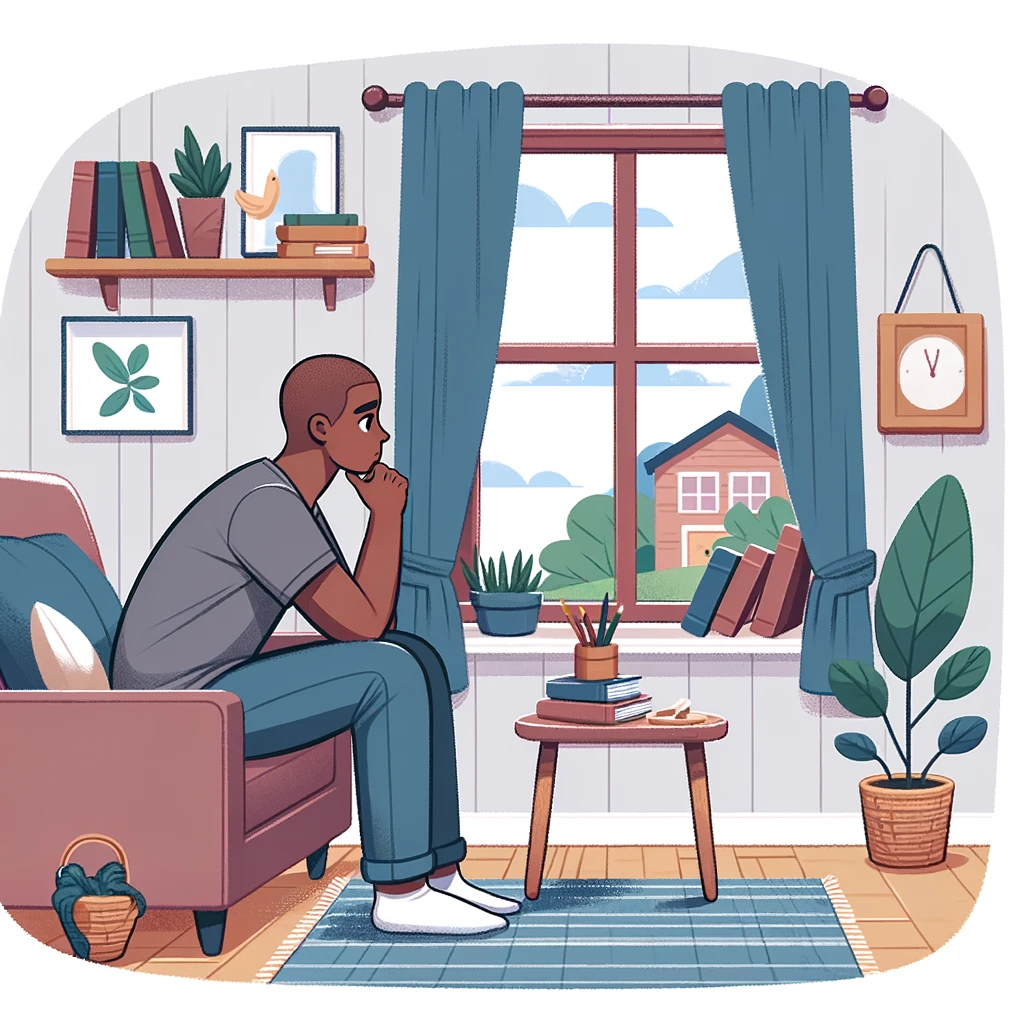Estimated reading time: 8 mins
Are you asking yourself “Why am I unhappy?” It’s a tough question. Often, the answer isn’t straightforward. But don’t worry. We’re going to explore this together, step by step. The goal here isn’t to offer quick fixes. Instead, we’ll focus on understanding the root cause of your unhappiness through self-reflection.

First, let’s acknowledge something important. Feeling unhappy is a natural part of life. It’s okay to feel this way sometimes. Now, let’s dive deeper into understanding these feelings.
Step 1: Why Am I Unhappy? First, Acknowledge Your Feelings
The first step in unraveling the “why” of your unhappiness is to fully acknowledge your feelings. It sounds simple, but it’s often where we stumble. Many of us have a habit of dismissing our emotions, especially the uncomfortable ones. So, pause and give yourself permission to feel. Ask yourself, “How am I really feeling right now?” Try to name these emotions. Are you feeling sad, frustrated, overwhelmed, or maybe disconnected? Recognizing and naming your emotions is a powerful step in understanding the essence of your unhappiness. This acknowledgement is not about judgment; it’s about giving your feelings the space they deserve.
Step 2: Look Back: what lead you to ask ‘Why Am I Unhappy?’
Embark on a journey back in time to trace the origins of your unhappiness. Think about when you first noticed these feelings. Think about when you first asked yourself ‘Why am I Unhappy?’ Was there a significant event, a subtle change, or a series of incidents? This step isn’t about dwelling in the past, but rather understanding its impact on your present state. Reflect on both the big picture and the tiny details of past events. Recognizing these pivotal moments can be enlightening, offering a clearer perspective on how your past experiences have shaped your current emotional landscape.
Step 3: Analyze Your Day-to-Day Life


Now, let’s delve into the details of your everyday life. Think about your typical day from morning to night. What do you spend most of your time doing? Are your days monotonous, lacking variety or excitement? Or are they frenzied and chaotic, leaving you no time to breathe? This step is all about observing the balance, or lack thereof, in your daily routine. Unhappiness can often stem from what we do, or don’t do, day in and day out. Reflect on how each part of your day contributes to your overall mood.
Step 4: Examine Your Relationships
Our relationships, whether with family, friends, or colleagues, significantly impact our emotional well-being. Reflect on the nature of your interactions. Are they fulfilling or draining? Do conflicts or misunderstandings frequently arise? Perhaps you feel isolated or overly dependent on others. Think about the level of support and understanding you receive. Healthy relationships should bring comfort and happiness, but when they turn sour, they can be a major source of distress. Understanding the dynamics of your relationships can be pivotal in identifying why you feel unhappy.
Step 5: Assess Your Physical Health
Our physical health is intricately linked to our emotional well-being. Ask yourself: Are you getting enough restful sleep, or are you often tired? How about your diet – is it nourishing and balanced? Don’t forget exercise; regular physical activity can greatly influence mood. Neglecting these aspects can lead to a decline in emotional health. Reflect on whether your physical habits are supporting your happiness or if they might be contributing to feelings of unhappiness. Sometimes, the body’s discontent can deeply affect the mind.
Step 6: Consider Your Environment
Your environment is more influential than you might realize. It’s not just about where you live, but also where you spend your time. Reflect on these spaces. Is your home a sanctuary or a source of stress? What about your workplace? Consider the noise level, the amount of clutter, and even the lighting. Each of these can subtly impact your mood. Also, think about the energy of the places you frequent. Are they uplifting or draining? Your surroundings can deeply affect your sense of well-being and, consequently, your happiness.
Step 7: Reflect on Your Achievements and Goals


This step involves a thoughtful look at where you stand in relation to your dreams and ambitions. Are your current achievements aligned with the goals you had set for yourself? Often, a sense of unhappiness can stem from a disconnect between our expectations and our reality. It’s not just about what you’ve achieved, but also about what you aspire to achieve. Reflect on whether these goals still resonate with you and if they’re guiding you towards a fulfilling path. Understanding this alignment, or lack thereof, can be a revealing factor in your feelings of contentment or discontent.
Step 8: Contemplate Your Self-Esteem
Self-esteem is like a mirror reflecting our deepest feelings about ourselves. When this mirror is clouded by negativity, it can be a significant source of unhappiness. Take a moment to really think about how you view yourself. Are you often critical or dismissive of your abilities and worth? Do you find yourself constantly battling feelings of inadequacy? Perhaps instead of asking ‘Why Am I Unhappy’, you might replace the question with ‘Do I Love Myself?’ Understanding the nuances of your self-esteem is not just insightful; it’s pivotal. It’s about recognizing and confronting those inner voices that undermine your sense of self-worth.
Step 9: Mindfulness and Emotional Awareness
Practicing mindfulness is a transformative step in understanding unhappiness. It’s more than just a buzzword; it’s about being fully present in each moment, observing your thoughts and feelings without criticism or judgment. This heightened awareness can offer profound insights into your emotional state. By paying attention to your inner experiences, you learn to recognize the subtleties of your emotions. Are certain thoughts or situations triggering your unhappiness? Mindfulness helps you detect these patterns, leading to a clearer understanding of your emotional landscape.
Step 10: Journaling Your Thoughts


Writing down your thoughts and feelings can be more than just therapeutic; it’s a way of decluttering your mind. Keeping a journal allows you to express emotions that you might not feel comfortable sharing with others. As you write, you might notice patterns or recurring themes in your feelings and experiences. This process of journaling isn’t just about venting; it’s a method of self-discovery, revealing insights into why you feel unhappy. Over time, your journal can become a valuable tool for understanding your emotional landscape.
Step 11: Think About Your Passions and Hobbies
Reflect on what genuinely excites and energizes you. What are your passions and hobbies? Often in the hustle of everyday life, we lose touch with activities that bring us joy. These are not just pastimes; they’re windows to our soul, indicators of what fulfills us. Reconnecting with these interests can be enlightening. It might reveal a missing piece in your life’s puzzle. Ask yourself, have you sidelined a hobby that once made your heart sing? Rediscovering these passions can offer surprising insights into your current state of happiness.
Step 12: Evaluate Your Work-Life Balance
A key aspect to consider is your work-life balance. It’s easy to get caught up in the hustle and forget to live. Ask yourself, how much of your day is consumed by work? Are your job demands encroaching on your personal time? This imbalance can lead to a deep-seated sense of unhappiness. Reflect on whether you have enough time for relaxation, hobbies, and quality moments with loved ones. A skewed balance might be silently chipping away at your happiness.
Step 13: Consider Past Traumas or Challenges
Our past shapes us, often more than we realize. Reflect deeply on your history. Have you faced traumas or significant challenges that might still affect you? This isn’t about reliving pain but acknowledging its impact. Sometimes, unresolved issues or past experiences cast long shadows over our present. Understanding this can be enlightening. Consider whether these experiences have left emotional scars. Are there patterns in your current life that mirror past struggles? Recognizing this link can be a vital step in understanding your current state of unhappiness.
Step 14: Look at Your Financial Health
Financial stress is a surprisingly common and often overlooked cause of unhappiness. There is a proven link between financial health and mental health. Take a moment to honestly assess your financial situation. Are you constantly worried about money? Does the thought of bills or savings make you anxious? Financial concerns can significantly impact your mental well-being, casting a shadow over other aspects of life. Reflect on how your finances might be influencing your mood and overall outlook. It’s not just about the amount in your bank account, but your feelings and attitudes towards money and financial security.
Step 15: Seek Feedback from Trusted Ones


At times, our own perspective may be clouded, making it hard to see the root of our unhappiness. This is where feedback from those we trust becomes invaluable. Reach out to friends, family, or mentors who understand you. Their external viewpoints can shed light on aspects of your life you might be overlooking. They can offer insights into patterns in your behavior or suggest possible reasons for your feelings that you haven’t considered. Remember, these people care about you and can provide honest, compassionate feedback.
Can you Now Answer “Why Am I Unhappy?”
Finding the root cause of unhappiness is a journey. It requires patience and honest self-reflection. Remember, the goal here is not to find a quick fix but to understand yourself better. By understanding the ‘why,’ you’re taking a crucial step towards emotional health and well-being. Keep these steps as a guide in your journey of self-discovery. Remember, you’re not alone in this. We all ask ourselves, “Why am I unhappy?” at some point. It’s a sign of strength to face this question head-on.
